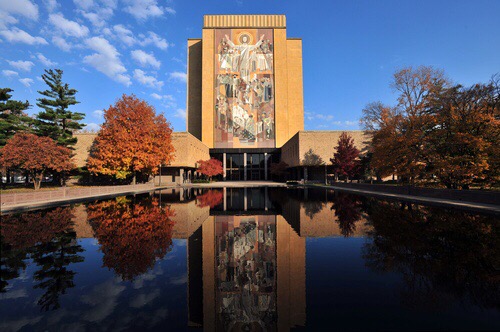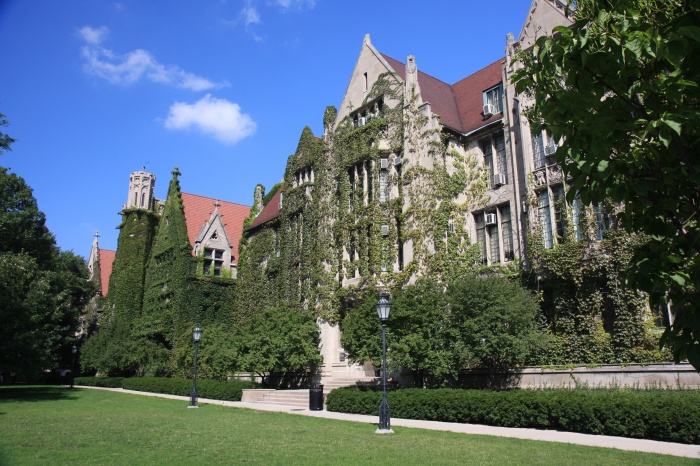Our summer seminars (2016, 2017) at the University of Notre Dame are geared toward early career researchers and advanced (finished with coursework) doctoral students in Philosophy, Psychology, and Theology/Religious Studies.
Each seminar participant attends each topic.
June 12-17, 2016 – Topic: “Virtue and Happiness”
Location: Moreau Seminary, University of Notre Dame
The Seminar is intended for outstanding advanced-level graduate students and early career researchers in the areas of Philosophy, Psychology, and Theology/Religious Studies. Our aim is to involve participants in our innovative and collaborative research framework within these three fields, and to provide an engaged environment to deepen and enliven their own research.
Faculty leaders and topics:

Owen Flanagan is James B. Duke University Professor of Philosophy at Duke University. He works in philosophy of mind, ethics, and comparative philosophy. His book, The Geography of Morals: Varieties of Moral Possibilitywill be published by Oxford University Press next year.
1. The Four Sprouts of Virtue in Mengzi:
Mencius, 4th c. BCE thinks there are four sprouts in human nature that if cultivated by the self and one’s community yield the virtues prized by Confucian ethics. The virtues are not sufficient for a good human life, but they are necessary. We’ll read and selections from Mencius and compare and contrast his view with modern psychological theories that posit sprout like foundations or modules upon which all moralities are built.
2. Destructive Emotions?:
Aristotle thought anger is a virtue if contained, if it is moderate, at the mean. Stoics such as Seneca challenged the Aristotelian view, arguing that anger should be (and can be) eliminated. Shantideva (8th c. CE), an important India Buddhist, made similar arguments for the elimination of anger in an entirely different tradition. We’ll discuss the Aristotelian, Stoic, and Buddhist views as well as objections and replies.

Jennifer A. Frey is an assistant professor in the philosophy department at the University of South Carolina and principal investigator with Virtue, Happiness, and the Meaning of Life. Prior to joining the philosophy faculty at UofSC, she was a Collegiate Assistant Professor of Humanities at the University of Chicago, where she was a member of the Society of Fellows in the Liberal Arts and an affiliated faculty in the philosophy department. She earned her PhD in philosophy at the University of Pittsburgh, and her B.A. in Philosophy and Medieval Studies (with Classics minor) at Indiana University-Bloomington. Her research lies at the intersection of philosophy of action and ethics, with a particular focus on the Aristotelian-Thomist tradition.
Action, Practical Reason, and Happiness:
We will explore the role that a general conception of happiness plays in the explanation of human action and in an account of practical reason. We will focus on writings from Thomas Aquinas and Elizabeth Anscombe, and we will put these into dialogue with contemporary action theorists and ethicists.

Darcia Narvaez is Professor of Psychology at the University of Notre Dame. She publishes extensively on moral development and education. Her most recent book is Neurobiology and the Development of Human Morality: Evolution, Culture and Wisdom (2014, Norton). She is executive editor of the Journal of Moral Education. She also writes a popular blog for Psychology Today (“Moral Landscapes”).
1. Neurobiology and moral development:
Neurobiological sciences provide increasing empirical evidence that early experience shapes capacities for sociality. These also influence morality and we can now delineate how moral development can go awry and how to at last partially repair it.
2. Ecological virtue and organic morality:
Humanity spent 99% of its history in small-band hunter-gatherer societies. These societies all around the world provide an early “nest” for their young that is slightly more intense than what emerged with social mammals over 30 million years ago. The species typical nest leads to a species typical human health, personality and nature whereas a species-atypical nest leads to the types of maladaptation and pathology seen in advanced nations like the USA.

Michael S. Sherwin, O.P., is Professor of Fundamental Moral Theology at the University of Fribourg, Switzerland. He has also taught at the Graduate Theological Union in Berkeley, California, where he received his initial formation as a Dominican and was ordained a priest in 1991. Fr. Sherwin is director of the Saint Thomas Aquinas Institute for Theology and Culture and of the Pinckaers Archives. Author of articles on the psychology of love, virtue ethics and moral development, his monograph, By Knowledge and By Love: Charity and Knowledge in the Moral Theology of St. Thomas Aquinas (CUA Press, 2005) has newly been reissued in paperback.
1. Virtue Transformed: A Christian Account of Human Excellence:
The account of character formation and moral development advanced by recent studies in philosophy and psychology offer a wonderfully helpful preparation for the Christian conception of the moral life. They prepare us both to see how grace heals and elevates human nature and to recognize the difference that grace makes: the exclusivity and self-sufficiency of the pagan ideal of virtue gives way in Christ to universality and divine dependence, a dependence that makes possible a life of moral excellent beyond what even the most brilliant pagan philosopher could have imagined: intimate friendship with God in a life that participates in the economy of salvation. This session offers an introduction to this fully Christian vision of moral development proper to the infused virtues of faith, hope, charity and the other infused virtues that belong to the Christian life.
2. On Love and Happiness: An Introduction to a Renewed Understanding of Christian Charity and Heavenly Beatitude:
What does it mean to love God and neighbor, and what is the relationship between this love and God’s love for us? Throughout the long history of Christian reflection on the character of Christian charity (agape), there has been a tension between love as desire and love as service. Is charity primarily the desire for God as our happiness and fulfilment, or is it exclusively the service of God, that seeks nothing for itself? Or is there a third element to charity that incorporates both service and desire, placing each in its proper perspective: love as the celebration and affirmation of the other? This session offers an introductory treatment of these questions by proposing both a renewed psychology of love and a renewed theology of charity’s relationship to Christ and his cross as the true and living way to heavenly beatitude.

Candace Vogler is the David B. and Clara E. Stern Professor of Philosophy and Professor in the College at the University of Chicago, director, and a principal investigator with Virtue, Happiness, and the Meaning of Life. She has authored two books, John Stuart Mill’s Deliberative Landscape: An essay in moral psychology (Routledge, 2001) and Reasonably Vicious (Harvard University Press, 2002), and essays in ethics, social and political philosophy, philosophy and literature, cinema, psychoanalysis, gender studies, sexuality studies, and other areas. Her research interests are in practical philosophy (particularly the strand of work in moral philosophy indebted to Elizabeth Anscombe), practical reason, Kant’s ethics, Marx, and neo-Aristotelian naturalism.
Self-Transcendence and Virtue:
On a roughly Thomist account, acquired virtue aims at the common good and is, to that extent, inherently self-transcendent. I am interested in considering whether the link goes in the other direction as well–are all of the forms of self-transcendent activity and engagement we are considering virtuous? Are they expressive of specific virtues? Are they linked in a more general way to cultivated good character? On the understanding we have been using, we can’t have virtue without an element of self-transcendence. Can we have self-transcendence without virtue?

Paul T.P. Wong, PhD, C.Psych is Professor Emeritus, Trent University, Adjunct Professor, Saybrook University, and a Fellow of APA and CPA. He is President of the International Network on Personal Meaning (INPM) and the Meaning-Centered Counselling Institute. In addition to being the editor-in-chief of the International Journal of Existential Psychology and Psychotherapy, he has edited two influential volumes on The Human Quest for Meaning (Routledge). A prolific writer, he is one of the most cited existential and positive psychologists. Since 2000, he has organized eight well-known and well attended Biannual International Meaning Conferences. He is the originator of Meaning Therapy, and he has been invited to give keynote addresses and meaning therapy workshops worldwide. He is the recent recipient of Carl Rogers Award from Div.32 (Humanistic Psychology) of APA.
The role of self-transcendence in virtue and happiness:
I will approach the topic of self-transcendence from both empirical psychological findings on the role of self-transcendence in wellbeing, and from Viktor Frankl’s seminal work on self-transcendence as the essence of spirituality and logotherapy. First, I will explain why Frankl’s self-transcendence is inherently virtuous, because of its emphasis on serving the common good or a higher purpose according to the ethical dimension of following one’s innate conscience and the time-tested universal value of love one another. Frankl’s concept is very important and relevant in the current context of international terrorism. Frankl took pain to emphasize the interpersonal ethical responsibility of self-transcendence to prevent another Hitler or terrorism in the name of false and bad kind of self-transcendence. Then, I will introduce specific interventions and demonstrate how to experience the cherished values of meaning, virtue and happiness through the spiritual practice of self-transcendence in daily life.
We will accept up to 25 students. The seminar is highly intensive, meeting twice a day for one week on each of the topics below and continue conversations informally over meals.
This seminar is supported by a generous grant from the John Templeton Foundation and our institutional partner the Jacques Maritain Center, and includes lodging, meals, tuition, and reimbursement up to $500 for travel. Accepted participants will be asked to pay a $200 registration fee.
Application deadline for the June 2016 Summer Seminar is January 15, 2016. For more information, visit our website https://virtue.uchicago.edu/summer-seminar-2016











